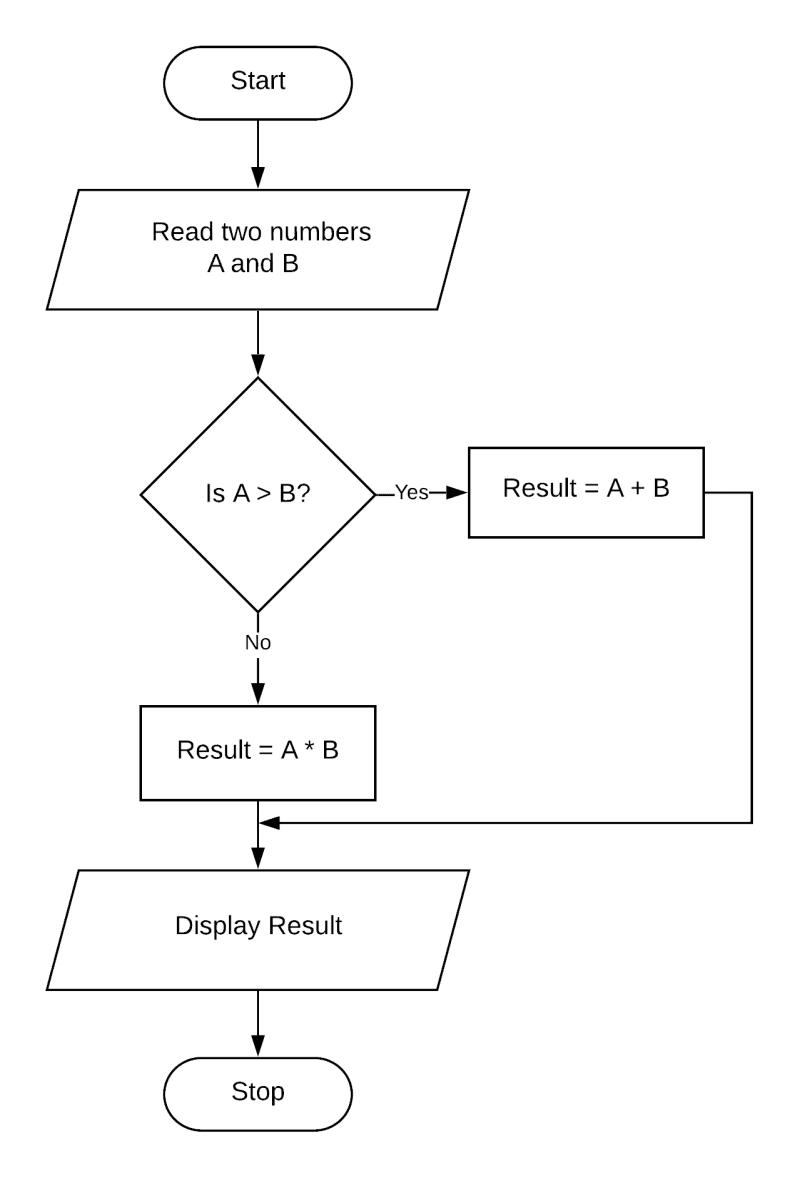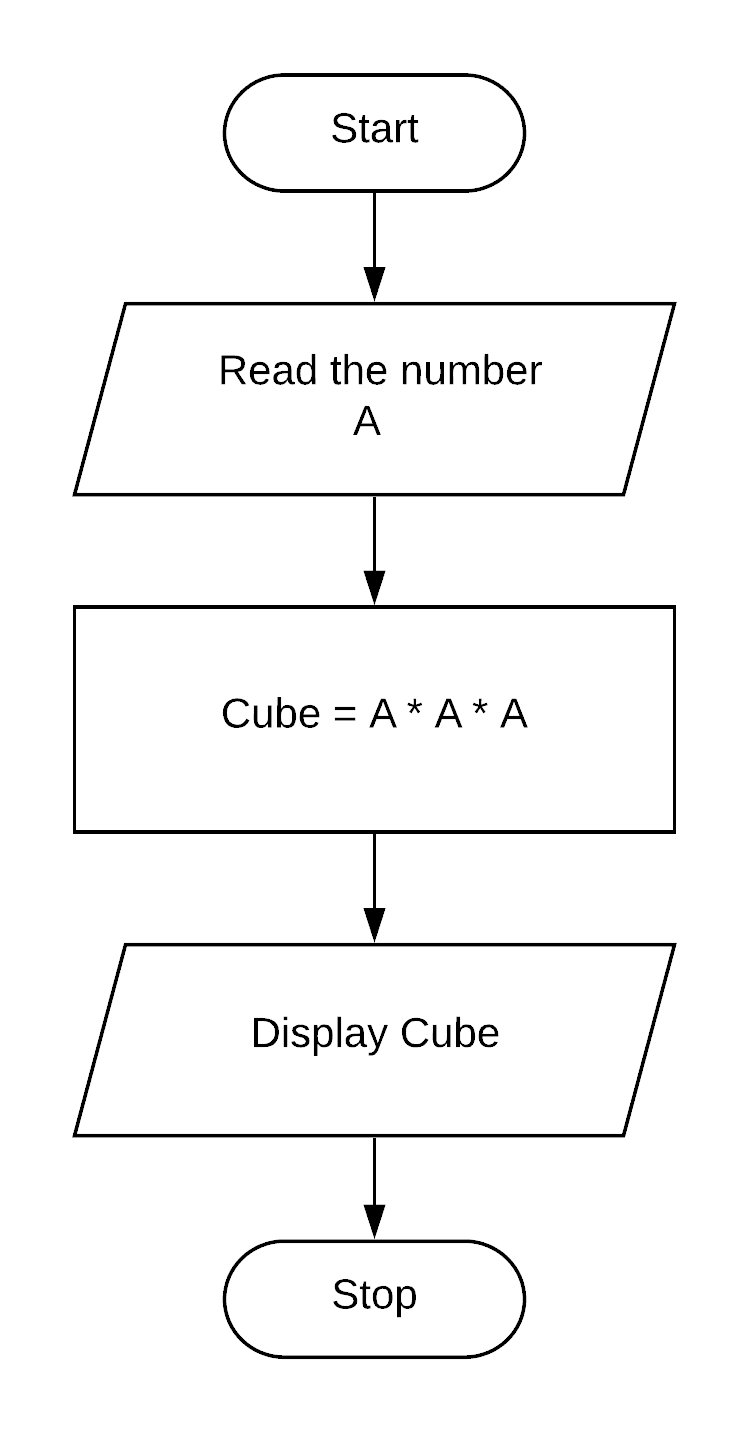Algorithms and Flowcharts
Fill in the blanks
Question 1
The step-by-step procedure to solve any problem is called Algorithm.
Question 2
Flowcharts are the pictorial representation of a program.
Question 3
The process of drawing a flowchart for an algorithm is known as Flowcharting.
Question 4
An algorithm should involve Finite number of steps to reach a solution.
Question 5
The Decision box is used for checking or applying any condition in the program.
State True or False
Question 1
A flowchart is not a pictorial representation of steps to get the solution of a problem.
False
Question 2
Algorithm means a set of rules which specify how to solve a specific problem.
True
Question 3
Flowcharts are helpful in analyzing the logic of problems.
True
Question 4
Connectors are used to connect the boxes.
False
Question 5
The general direction of flow in any flowchart is from bottom to top or from right to left.
True
Multiple Choice Questions
Question 1
In a flowchart, .......... indicate the sequence of steps and the direction of flow.
- Flow lines ✓
- Decision box
- Processing box
Question 2
.......... is used to accept input and give output of a program.
- Flow lines
- Input/Output box ✓
- Decision box
Question 3
The .......... represents the starting or ending point of a program.
- Decision box
- Flow lines
- Start /Stop box ✓
Question 4
.......... connectors are used to join the parts of a flowchart contained within the same page.
- On Page ✓
- Off Page
- None of these
Draw the flowchart symbols for the following
Start:
Stop:
Input A, B:
A= A + 1:
Is A > B:
Print A:
Answer the following
Question 1
What is an algorithm? Write any three characteristics of an algorithm.
Answer
The step-by-step procedure to solve any logical and mathematical problem is called an Algorithm. Three characteristics of an algorithm are:
- Input — An algorithm accepts an input.
- Generality — An algorithm works in a set of inputs.
- Definiteness — Each instruction should be written in a simple and precise manner so that everyone can understand it.
Question 2
Define the term flowchart. Write any two advantages of a flowchart.
Answer
A flowchart is a pictorial representation of the steps or an algorithm used to solve a particular problem. Two advantages of a flowchart are:
- Communication — The pictorial representation of the flowchart provides better communication. It is easier for the programmer to explain the logic of a program.
- Effective Analysis — It is a very useful technique, as flowchart is a pictorial representation that helps the programmer to analyze the problem in detail.
Question 3
What is the use of input/output box?
Answer
It is used for accepting inputs or giving output of the program.
Question 4
When do we use the Process box?
Answer
It is used for writing the processing instructions and doing calculations.
Question 5
What is the use of Decision box?
Answer
It is used for checking or applying any condition in the program.
Write algorithms for the following problems
Question 1
To polish your shoes.
Algorithm
Step 1: Start
Step 2: Open the shoe polish
Step 3: Put shoe polish on brush
Step 4: Polish one shoe
Step 5: Put shoe polish on brush
Step 6: Polish the other shoe
Step 7: Close the shoe polish
Step 8: Stop
Question 2
To input three sides of a triangle and print if it is scalene, isosceles or equilateral.
Algorithm
Step 1: Start
Step 2: Read three sides of triangle and store them in a, b, c.
Step 3: Check if a == b and b == c
Step 4: If true, print "Equilateral Triangle" and goto step 8
Step 5: Check if a == b or b == c or c == a
Step 6: If true, print "Isosceles Triangle" and goto step 8
Step 7: Print "Scalene Triangle"
Step 8: Stop
Draw the following flowcharts
Question 1
Draw a flowchart in Microsoft Word for buying stationery from the market.
Flowchart

Question 2
Draw a flowchart in Microsoft Word for the steps required to play music stored in a CD.
Flowchart

Question 3
Draw a flowchart in Microsoft Word to accept two numbers, if the first number is greater than the second number, print their sum, otherwise print their product.
Flowchart

Question 4
Draw a flowchart in Microsoft Word for the steps required to find the cost of 24 pens when the cost of one pen is Rs. 12.
Flowchart

Write an algorithm and draw the flowchart for the following
Question 1
Finding the cube of a given number.
Algorithm
Step 1: Start
Step 2: Read the number and store it in a.
Step 3: Calculate cube of number as a * a * a
Step 4: Print cube of number
Step 5: Stop
Flowchart

Question 2
Print the smallest of two numbers.
Algorithm
Step 1: Start
Step 2: Read the two numbers and store them in a and b.
Step 3: Check if a < b
Step 4: If true then print a and goto step 6
Step 5: If false then print b
Step 6: Stop
Flowchart

Correct the Flowchart symbols
Question 1
To wash the face
Corrected Flowchart

Question 2
To multiply the two numbers
Corrected Flowchart

Make flowcharts for the following statements
Question 1
Accept the age of a person. Display the message Eligible For Role if the age is equal to or greater than 18, otherwise display the message Not Eligible.
Flowchart

Question 2
Input a name. If name is Kabir, then accept marks. If marks are >= 85, then display Good Performance else display Pass.
Flowchart

Question 3
Accept one character. Display the message Vowel if the entered character is a vowel, otherwise display the message Not a Vowel.
Flowchart

Question 4
Input a year. Display the message Leap year if the entered year has 366 days, otherwise display the message Not a leap year.
Flowchart






